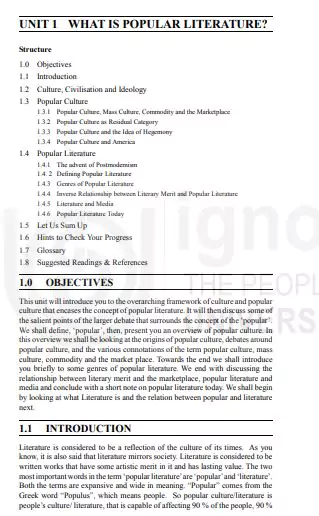‘What Is Popular Literature’ PDF Quick download link is given at the bottom of this article. You can see the PDF demo, size of the PDF, page numbers, and direct download Free PDF of ‘Popular literature PDF’ using the download button.
What Is Popular Literature Book PDF Free Download

Popular Literature PDF
Literature is considered to be a reflection of the culture of its times. As you know, it is also said that literature mirrors society.
Literature is considered to be written works that have some artistic merit in it and lasting value.
The two most important words in the term ‘popular literature’ are ‘popular’ and ‘literature’. Both terms are expansive and wide in meaning.
“Popular” comes from the Greek word “Populus”, which means people.
So popular culture/literature is people’s culture/ literature, that is capable of affecting 90 % of the people, 90 % of the time.
Popular is one of the most widely circulated terms in today’s critical discourse: in literature, politics and social studies, it pertains to the ordinary, the accessible, well-liked, informal and to policies and artifacts benefiting people.
What is important is that to understand popular literature in all its dimensions, it is essential to be aware of the genesis, background, and milieu in which this term has gained currency and meaning.
“Popular Literature” includes both fiction and non-fiction. To understand its varied dimensions, a close look at the phenomenon of “mass culture” and reading taste is required and that is what we shall look at next.
In this section we shall look at the background of popular literature by beginning with a pertinent question –
What is Culture?
‘Culture’ is a term that has been under scrutiny for a long time. Operating simultaneously along several competing axes of meaning, one needs to pay close attention to the context in which it is used in order to determine its several possible meanings.
Each age has witnessed a troubled and problematic understanding of the notion of culture.
Raymond Williams describes culture as “one of the two or three most complicated words in the English language.” (Williams, 1976, 76) Thus, it will be useful to trace the evolution of the notion of culture chronologically.
Tracing the word back to its Latin roots, we find that the word ‘culture’ is culture, from the root collar, which has a range of meanings: inhabit, cultivate, protect, honor with worship.
The primary meaning then was in husbandry, the tending of natural growth.
For a long time ‘culture’ was thus, used as a ‘noun of process’ to refer to the tending, growth or cultivation of something, usually, crops or animals (Williams in Bennett, 1981, 77). In the 16th century ‘culture’ referred to the growth or cultivation of human attributes.
By the 18th century it functioned, as a synonym for the Enlightenment’s concept of civilization.
During the Enlightenment, the only form of culture that was sanctified was the official, elite culture of European societies.
In the 19th century, however, the meanings of the term ‘culture’ expanded and began to be differentiated from that of ‘civilization’.
In the 18th century, with the rise of industrialization, the term ‘Civilisation’ was limited to describing the development of economic, social and political institutions, and the word ‘culture’ was regarded as a particular set of codes of conduct or attitudes which were held to be best exemplified in works of art, of the select few, who are the proclaimed guardians of good taste.
Mathew Arnold in Culture and Anarchy (1869), referred to real culture as, ‘the best that had been thought and said in the world’.
But soon in the 19th century ‘culture’ began to be used in the plural. An interesting addition was the term ‘folk’ or ‘peasant’ culture.
This led to the use of the term ‘cultures’ referring to at least two kinds of culture, one of the ‘select few’ and the other, of the people, especially the peasantry.
In most academic quarters, it is usually argued that the term ‘culture’ stands for those artistic pursuits that are considered to be of a certain value or standard i.e. culture proper.
Other forms of activity are looked at differently – as entertainment, recreation or leisure or, pejoratively, as ‘mass culture.
It was not until the early 19th century that ‘popular’ was used as a term of recommendation – albeit in a fairly casual way in the sense that the thing or person(s) to which it was applied were ‘well-liked by many people (Williams, 1976, 199) and, moreover, that this was to be counted in their favor.
The traditional classical concept of ideology was considered close to ‘culture’, What is Popular Literature? but it suggested those forms of intellectual and artistic activity, which were related to economic and political practices.
Thus, it may be suggested that culture should be used as a general term to refer to ‘the complex unity of those practices that produce sense’, reserving the term ideology for specific types of culture – for political ideas.
To sum up, the term culture is largely used as an umbrella term to refer to all of those activities, or practices, which produce sense or meaning.
This includes the customs and rituals that govern or regulate our social relationships on a day-to-day basis as well as those texts literary, musical, and audiovisual – through which the social and natural world is re-presented or signified.
Culture in modern times demands an encounter with newer terrains and transitions.
Culture helps people develop. There are claims that culture consists of tacit knowledge, and is the domain of primary socialization. Culture is also a bunch of memory, history, and the past.
| Author | |
| Language | English |
| No. of Pages | 12 |
| PDF Size | 0.3 MB |
| Category | Literature |
| Source/Credits | egyankosh.ac.in |
Popular Literature PDF Free Download
